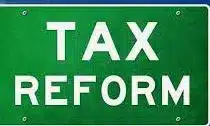The tax reform bills proposed by President Bola Ahmed Tinubu have taken centre stage in Nigeria’s legislative discussions, sparking nationwide debate.
Last Thursday, the bills passed their second reading in the Senate despite notable objections from some lawmakers. Senate Leader Michael Opeyemi Bamidele described the move as an essential step towards modernising Nigeria’s tax system, adding that the reforms aim to streamline tax administration and reduce the financial burden on low-income earners and small businesses.
Join our WhatsApp ChannelHere’s an in-depth look at the key provisions and implications of the tax reform bills.
1. Four Key Tax Reform Bills
The reform package includes four main pieces of legislation:
- The Nigeria Tax Bill
- The Nigeria Tax Administration Bill
- The Nigeria Revenue Service (Establishment) Bill
- The Joint Revenue Board (Establishment) Bill
Each bill addresses distinct areas such as tax compliance, enforcement, administration, and taxpayer rights.
2. Simplifying Tax Administration
The Nigeria Tax Administration Bill aims to unify tax rules across federal, state, and local levels. This measure is expected to enhance transparency and reduce compliance costs for taxpayers.
3. Reduced Corporate Income Tax
The bills propose reducing the corporate income tax rate from 30% to 25% over the next two years. Lawmakers supporting the reform say this change will alleviate financial pressures on businesses and encourage investment.
4. New Revenue Distribution Formula for VAT
Under the reforms, value-added tax (VAT) revenues will be allocated based on consumption rather than being centrally pooled. Federal Inland Revenue Service (FIRS) Chairman Zacch Adedeji stated that this change reflects VAT’s purpose as a consumption tax.
5. Tax Exemptions for Low-Income Earners
Low-income earners earning below the national minimum wage will be exempt from the Pay As You Earn (PAYE) tax. Similarly, small businesses with annual turnovers below ₦50 million will no longer be required to pay income tax.
6. Establishing the Nigeria Revenue Service
The Nigeria Revenue Service (NRS) is set to replace the current FIRS. This rebranding aims to centralize tax collection, improve accountability, and streamline processes.
7. Promoting Taxpayer Rights
The establishment of a Joint Revenue Board will replace the existing Joint Tax Board. The new entity will focus on protecting taxpayer rights, resolving disputes, and fostering a more unified tax administration.
8. Focus on Local Revenue Generation
Local governments will have enhanced powers to manage taxes, fines, and rates within their jurisdictions under the Joint Revenue Board (Establishment) Bill. This measure seeks to improve local revenue generation.
9. Progressive VAT Rates
VAT rates are projected to rise incrementally from the current 7.5% to 15% by 2030. However, essential goods such as food and medicine will remain exempt.
10. Exempting Basic Necessities
The bills ensure that food, electricity, school fees, and medical services remain VAT-free, protecting low-income households from additional financial burdens.
11. Encouraging Private Sector Investment
Tax breaks and incentives under the reforms are targeted at boosting investments in critical industries such as energy and manufacturing.
12. Eliminating Double Taxation
Provisions in the reforms aim to eliminate double taxation on businesses operating across multiple states. This will reduce financial strain and compliance challenges.
13. Improving Tax Refunds
Taxpayers eligible for refunds will receive them faster, as the reforms mandate that funds for verified refunds be deducted from collections upfront.
14. Introducing a Tax Ombudsman Office
The creation of a Tax Ombudsman Office will provide a channel for taxpayers to report grievances and ensure fair treatment by tax authorities.
15. Addressing Tax Evasion
New measures, including audits of high-spending individuals and businesses, are aimed at curbing tax evasion. Bank records will be reviewed to identify discrepancies.
16. Supporting Energy Development
Tax incentives for gas projects are included in the reforms to encourage investments in both associated and non-associated gas projects, boosting Nigeria’s energy sector.
17. Streamlining Tax Penalties
The reforms propose harmonized penalties for tax offences across federal, state, and local levels to improve compliance.
18. Dispute Resolution Mechanism
A Tax Appeal Tribunal will be established to handle disputes, particularly those arising over tax residency and related matters.
READ ALSO: How Tax Reform Bills Stir Controversies, Further Divide Citizens
19. Payment Flexibility
Businesses assessed in foreign currencies will be allowed to pay taxes in naira at official exchange rates.
20. Funding for Student Loans
A portion of the revenue from the new development levy will be allocated to student loans starting in 2030, directly benefiting the education sector.
21. Increased VAT Share for States
States’ share of VAT revenue will increase to 55%, while the federal government’s share will decrease to 10%. This shift is intended to strengthen state economies.
22. Public Hearing Scheduled
The Senate has referred the tax reform bills to its Committee on Finance for review, with public hearings expected in the coming weeks.
23. Mixed Reactions to the Bills
While supporters commend the reforms for being pro-poor and business-friendly, critics argue that more stakeholder engagement is needed to ensure fairness.
24. Aligning with Economic Goals
The proposed reforms aim to reduce Nigeria’s reliance on oil revenue and foster a diversified economy.
25. Potential Impact on Nigerians
If successfully implemented, the reforms could simplify tax payments, reduce poverty, and attract investments, creating a more equitable tax system.
What’s Next?
The fate of the tax reform bills will depend on the outcome of Senate deliberations and public consultations. Analysts believe these reforms have the potential to transform Nigeria’s tax landscape, provided they are executed transparently and inclusively.
Emmanuel Ochayi is a journalist. He is a graduate of the University of Lagos, School of first choice and the nations pride. Emmanuel is keen on exploring writing angles in different areas, including Business, climate change, politics, Education, and others.
- Emmanuel Ochayihttps://www.primebusiness.africa/author/ochayi/
- Emmanuel Ochayihttps://www.primebusiness.africa/author/ochayi/
- Emmanuel Ochayihttps://www.primebusiness.africa/author/ochayi/
- Emmanuel Ochayihttps://www.primebusiness.africa/author/ochayi/




















Follow Us